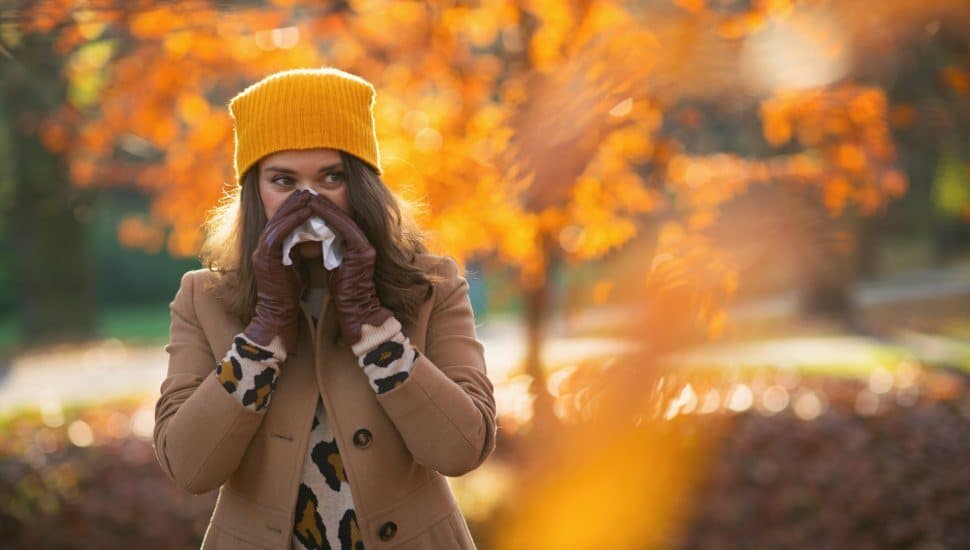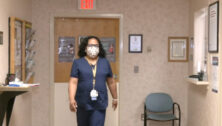Fall Allergies: What Really Causes Them and How to Prevent Them

Apple picking, pumpkin spice, and flannel shirts are all things you may be looking forward to with fall around the corner. The weather has cooled down, and hay rides are calling your name.
With fall, there are many things to get excited about, but one thing you might be dreading is fall allergies.
While there is some overlap in symptoms of allergies and COVID-19, it’s important to remember COVID-19 is often accompanied by a fever and shortness of breath. When in doubt, conduct a rapid or PCR test for COVID-19.
Along with fun flavors and outdoor activities, fall also can bring sneezing, sniffling, and scratchy throats. But what’s actually causing it? Fall allergies come in all shapes and sizes, and yours might be caused by a variety of different factors.
Ragweed or Pollen
Ragweed is a common plant in the US, and even more common is the large amounts of pollen it produces. In fact, a single ragweed plant can create up to 1 billion grains of pollen per season.
Ragweed is typically associated with fall, but it actually begins blooming earlier than you might expect. In Pennsylvania, ragweed blooms when the days become shorter and the weather begins changing — which typically means ragweed may become a bother as early as the middle of August.
With a high pollen count and a pre-fall blooming season, you may be wondering what you can do to get ahead of this pesky allergen. One way you can stay on top of ragweed allergies is to stay on top of local pollen counts where you live. Here is an easy-to-use tool to help you keep track of pollen counts for your area each day.
Dust Mites
Another common fall allergen is one that might surprise you: dust mites. You may be thinking, “Isn’t dust a year-long thing?” This is true, but it can become more present when the seasons change or it becomes more humid — like the shift from summer to fall.
Dust mites are one of the most common indoor allergies, and it can be particularly irritating when it feels like the allergen is coming from inside of your house. While it might seem like you clean and clean — and there’s still dust in your house — you can still take steps to minimize your allergies.
To combat an allergy to dust mites, try to:
- Maintain a humidity level in your home below 50 percent
- Wash your sheets in hot water once a week
- Protect your bed with a dust-proof mattress cover
Mold
While many people might be focused on ragweed during the fall, another common fall allergy is mold. During the fall, the temperature is constantly changing and there is a rise in rainfall and humidity levels. This can lead to an increase in mold and mildew.
Unlike pollen (which mostly occurs outside) or dust (which mostly becomes a problem inside), mold can grow both outdoors and indoors. This can make it a particularly difficult fall allergen.
For indoor mold, try to keep a low humidity level in your house (below 45 percent). You can do this with a dehumidifier.
To limit your exposure to outdoor mold, try to limit activities that might put you in contact with it — like raking a wet leaf pile.
What Can You Do About Fall Allergies?
While there are specific tips that can help you handle individual allergens, they may not be enough to fully address fall allergies in general. That’s why it’s a good idea to talk to your Chester County Hospital provider.
By bringing your fall allergies and symptoms to your primary care provider, they can help you identify triggers, connect you with an allergy specialist, or help you devise a treatment plan.
Here are some different treatment options that might help you handle your fall allergies.
Over-The-Counter or Prescription Medications
One way to manage your allergies is with over-the-counter and prescription medications. These could include anything from oral medications like a pill to a nasal spray or even eye drops.
Nobody’s allergies are exactly the same, and what might work for you might not work for someone else. Finding what helps your allergies the best can help you relax when it comes to indoor and outdoor fall activities.
If you know fall allergy symptoms are coming your way, now is a good time to double-check the medicine cabinet and get the allergy meds you need. Having your medication ready to go — before allergy season starts — can help you get ahead of your symptoms. You can start to take your allergy medication two to three weeks before developing symptoms to help reduce the intensity of your allergies.
Allergy Shots
Another way to treat fall allergies is with immunotherapy or allergy shots. When it comes to treatment for persistent or recurring allergies, immunotherapy may be able to provide lasting relief.
Your Chester County Hospital provider or specialist can help determine what kind of plan will best suit your needs — both in terms of frequency and how long it lasts. Though there are different kinds of treatment plans, one thing that stays the same is how important it is to go to your scheduled appointments — especially the ones before and during allergy season.
EpiPen (For Serious Allergic Reactions)
Some allergies are more serious than others. This is true for food allergies as well as seasonal allergies. If you have an extreme allergy, it is crucial that you are prepared to address a serious allergic reaction with an EpiPen.
An EpiPen is a medical device that can treat a life-threatening allergic reaction — also called anaphylaxis — with a dose of Epinephrine. Epinephrine can help slow down the effects of an allergic reaction by affecting your muscles, airways, and blood vessels.
To help manage a severe allergy, be sure you always have your EpiPen with you. It is also good to talk to your loved ones about how to use your EpiPen — and what symptoms of anaphylaxis to look out for — in case there’s an emergency situation.
Don’t “Fall” for Fall Allergies
While it might seem like fall allergies are an annoying part of life that you just have to deal with, there are many ways you can begin to address and manage them. You don’t have to simply live with a scratchy throat, runny nose or watery eyes — your Chester County Hospital provider can help determine a plan that works for you.
This year, say goodbye to fall allergies and hello to enjoying this festive season!
For more information about allergists/immunologists at Chester County Hospital — and how they can help you with fall allergies — call our Physician Referral Service at 800-789-PENN (7366) or visit the Find a Doctor section of our website.
Learn more at the Chester County Hospital.
Connect With Your Community
Subscribe to stay informed!
"*" indicates required fields



![95000-1023_ACJ_BannerAd[1]](https://vista.today/wp-content/uploads/2023/03/95000-1023_ACJ_BannerAd1.jpg)













































